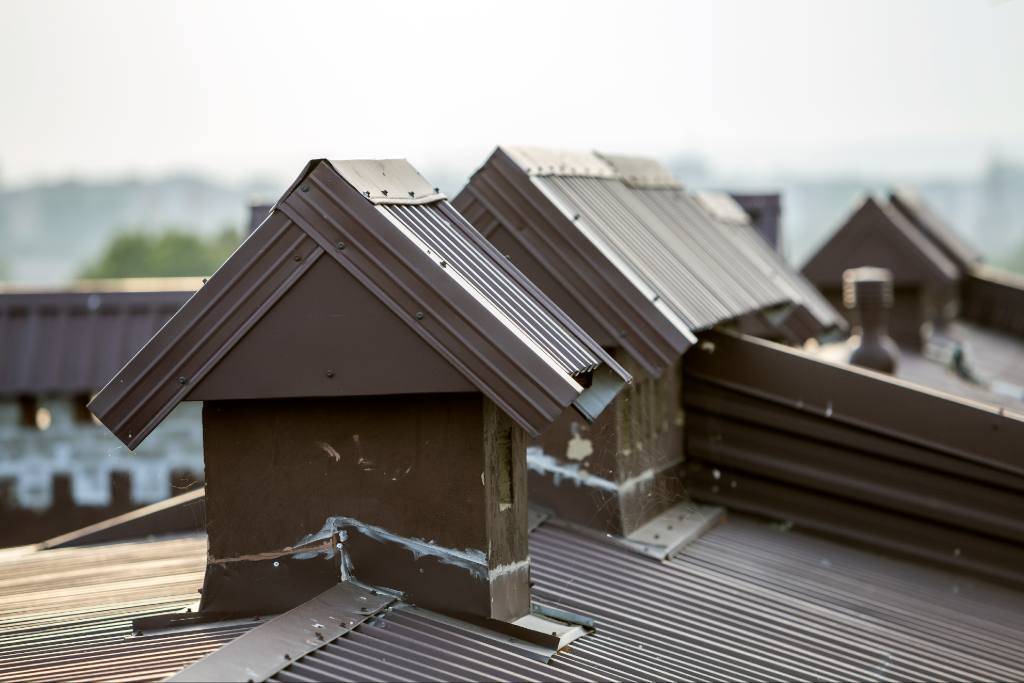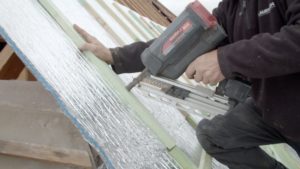Which Insulation Type Is Best for Metal Roofs?

Metal roofs are a popular choice for both commercial and residential buildings due to their durability, longevity, and low maintenance. However, they present unique challenges when it comes to insulation. Without proper metal roof insulation, buildings can experience heat transfer, condensation, and fluctuating indoor temperatures, leading to higher energy costs and reduced comfort.
Choosing the right insulation type is critical for addressing these challenges and ensuring long-term efficiency and performance, and there isn’t always one right answer.
Why Insulating a Metal Roof Is Essential
Metal roofs are excellent conductors of heat, meaning they absorb and transfer heat quickly. In the summer, this can result in excessive heat gain, while in the winter, significant heat loss may occur. These temperature swings can create an uncomfortable indoor environment and strain HVAC systems, increasing energy costs.
Additionally, metal roofs are prone to condensation. When warm, moist air comes into contact with the cool surface of a metal roof, condensation forms, which can lead to water damage, mold growth, and corrosion. Proper insulation addresses both temperature regulation and moisture control, making it an essential component of any metal roof system.
Key Factors to Consider When Choosing Metal Roof Insulation
Before selecting an insulation type, it’s important to evaluate the specific needs of your building. Consider these factors:
- Climate: Buildings in warmer climates need insulation that reflects radiant heat, while colder climates require materials with high thermal resistance to prevent heat loss.
- Moisture Control: Insulation with vapor barrier properties helps reduce condensation and protect the roof and building envelope from water damage.
- Energy Efficiency: Insulation should minimize heat transfer, reducing HVAC demand and lowering energy bills.
- Ease of Installation: Insulation materials should be easy to install and compatible with the roof system, whether it’s a retrofit or new construction.
Best Insulation Options for Metal Roofs
Here are the most effective insulation types for metal roofs, each with its own strengths and ideal applications:
1. Reflective Vapor Barrier Insulation
Reflective vapor barrier insulation, such as Quattro’s reflective vapor barrier, is one of the most effective solutions for metal roofs. This insulation type combines radiant heat reflection with moisture control, offering dual benefits that address the unique challenges of metal roofs.
How It Works: The reflective surface repels radiant heat, reducing heat transfer into the building during hot weather. The built-in vapor barrier prevents water vapor from condensing on the roof’s surface, protecting against mold and corrosion.
Best For: All climates, especially areas with high humidity or significant temperature fluctuations.
Advantages:
- Lightweight and easy to install
- Combines radiant heat reflection and moisture control
- Long-lasting and durable
2. Rigid Foam Insulation
Rigid foam boards, such as extruded polystyrene (XPS) or polyisocyanurate, provide high thermal resistance and are often used in metal roof applications. They are installed directly under the metal panels or on the roof deck, offering a continuous layer of insulation.
How It Works: Rigid foam acts as a thermal barrier, minimizing heat transfer through the roof and reducing energy costs. It is also resistant to moisture, preventing water damage.
Best For: Roofs in colder climates where heat retention is critical.
Advantages:
- High R-value per inch
- Durable and moisture-resistant
- Reduces thermal bridging
3. Spray Foam Insulation
Spray foam insulation is a versatile option, as it can be applied to the underside of metal roof panels. It expands upon application, filling gaps and creating an air-tight seal.
How It Works: Spray foam reduces heat transfer and prevents air leaks, enhancing energy efficiency. Closed-cell spray foam also provides moisture resistance, reducing condensation.
Best For: Retrofitting existing metal roofs with irregular surfaces.
Advantages:
- High R-value and air-sealing properties
- Adapts to hard-to-reach areas
- Acts as an additional structural support
4. Fiberglass Insulation
Fiberglass batts or rolls are commonly used for insulating roofs and walls. While they are not specifically designed for metal roofs, they can be paired with vapor barriers to enhance performance.
How It Works: Fiberglass traps air within its fibers, providing thermal resistance. However, it must be used with a vapor barrier to prevent moisture absorption.
Best For: Budget-conscious projects in mild climates.
Advantages:
- Cost-effective
- Easy to handle and install
- Offers soundproofing benefits
Why Quattro’s Reflective Vapor Barrier Insulation Stands Out
Quattro’s reflective vapor barrier insulation is particularly well-suited for metal roofs. Its unique design offers both radiant heat reflection and moisture control, addressing the primary challenges of metal roof insulation. Reflecting radiant heat keeps indoor temperatures stable, reducing the strain on HVAC systems and lowering energy costs. The integrated vapor barrier prevents condensation, protecting the roof from mold, mildew, and corrosion.
If you’re looking for the best insulation for your metal roof, contact us today to learn more about how Quattro’s solutions can improve your project’s energy efficiency and moisture control!


